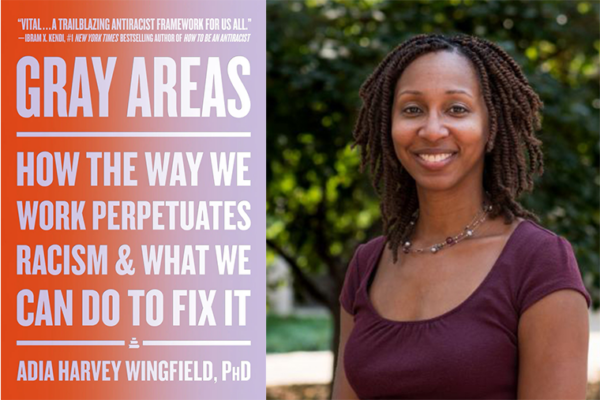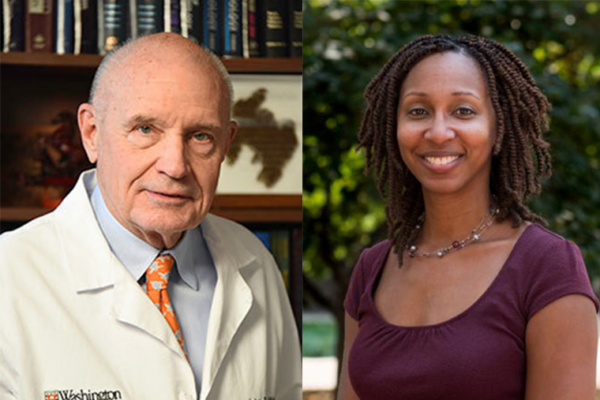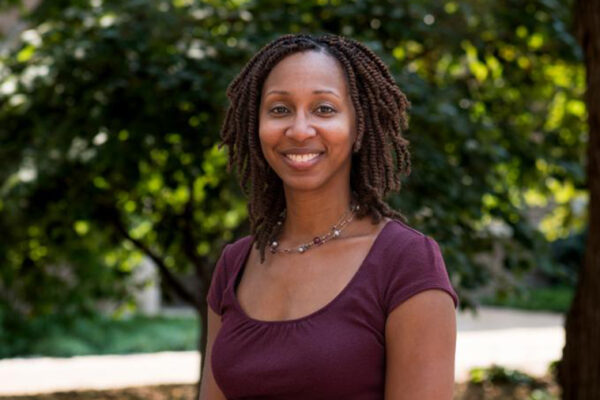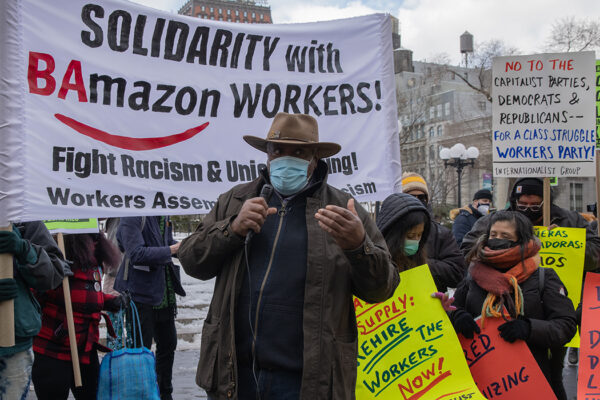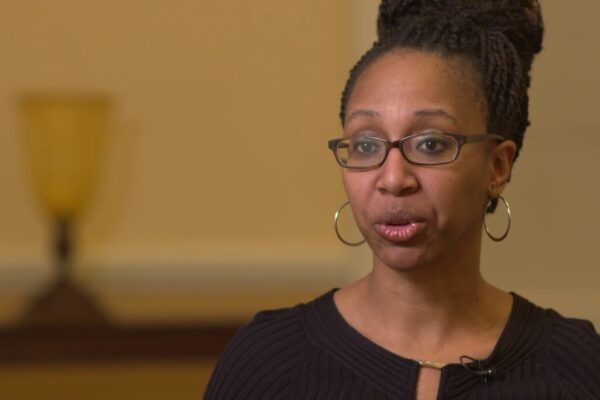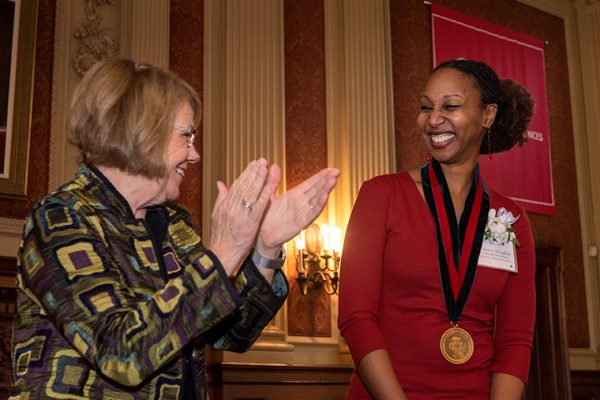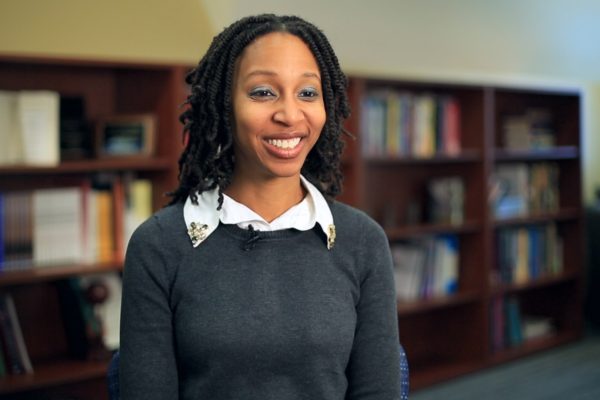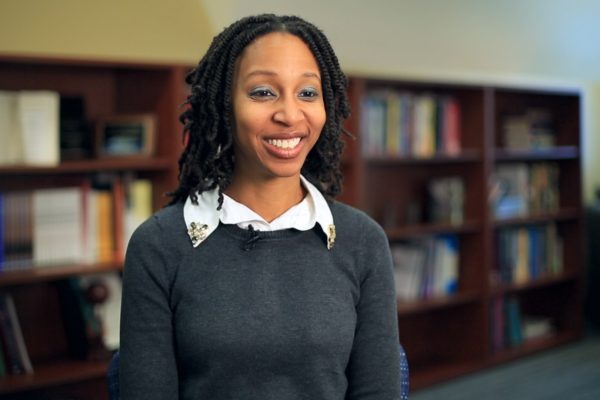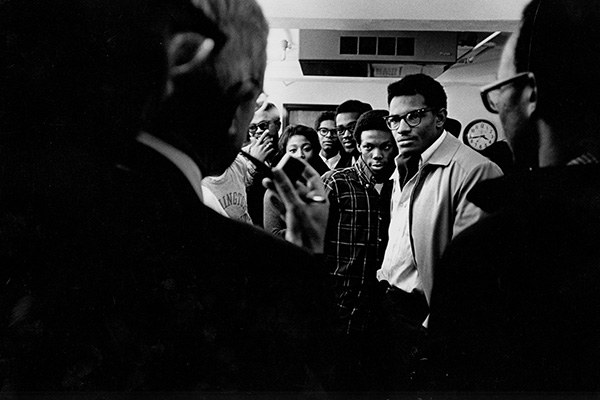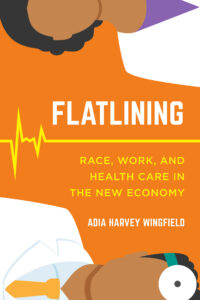Wingfield specializes in research that examines the ways intersections of race, gender, and class affect social processes at work. In particular, she is an expert on the workplace experiences of minority workers in predominantly white professional settings, and specifically on Black male professionals in occupations where they are in the minority. Wingfield has lectured internationally on her research in this area, and her research has been published in numerous peer-reviewed journals including Social Problems, Gender & Society, Qualitative Sociology, and American Behavioral Scientist. She is the author of several books, including “Gray Areas: How the Way We Work Perpetuates Racism & What We Can Do to Fix It” and “Flatlining: Race, Work, and Health Care in the New Economy.”
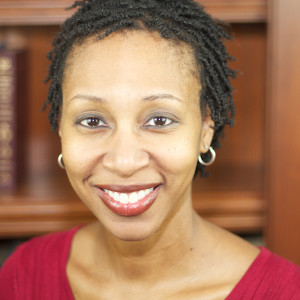
Adia Harvey Wingfield
Professor of Sociology
Contact Information
- Phone: 314-935-5239
- Email: ahwingfield@wustl.edu
- Website: Website
Media Contact
In the media
Trump says he killed DEI. So why isn’t it dead yet? Cracks emerge in war on ‘woke’
Adia Harvey Winfield, the Mary Tileston Hemenway Professor of Arts & Sciences
Trump wants to destroy DEI. But is America really giving up ‘woke ideology?’
Adia Harvey Wingfield, the Mary Tileston Hemenway Professor of Arts & Sciences
Trump wants to undo diversity programs. Some agencies react by scrubbing US history and culture
Adia Harvey Wingfield, the Mary Tileston Hemenway Professor of Arts & Sciences
‘The way to do the work is slowly, surely, and over time’: Corporate America and DEI
Adia Harvey Wingfield, the Mary Tileston Hemenway Professor of Arts & Sciences
Walmart, Once Eager to Promote Diversity, Pulls Back Amid Conservative Pressure
Adia Harvey Wingfield, the Mary Tileston Hemenway Professor of Arts & Sciences
‘DEI candidate.’ What’s behind the GOP attacks on Kamala Harris.
Adia Harvey Wingfield, the Mary Tileston Hemenway Professor of Arts & Sciences
Opinion: Could these laws fix America’s broken work culture?
Adia Harvey Wingfield, the Mary Tileston Hemenway Professor of Arts & Sciences
The backlash against diversity, equity and inclusion in business is in full force − but myths obscure the real value of DEI
Given that research shows workforce diversity helps companies boost profits, it’s surprising to me that more leaders don’t take this approach. The alternative is letting a false narrative that imperils their growth go unchallenged, writes Adia Harvey WIngfield.
Working While Black
Adia Harvey Wingfield, professor of sociology
‘We are fundamentally a racist and sexist society’: How top companies in US are struggling to diversify leadership
Adia Harvey Wingfield, the Mary Tileston Hemenway Professor of Arts & Sciences
For many Black employees, working from home can provide relief from inequitable workplaces
Adia Harvey Wingfield, the Mary Tileston Hemenway Professor of Arts & Sciences
Longtime Merck CEO, minority advocate Ken Frazier to retire
Adia Harvey Wingfield, the Mary Tileston Hemenway Professor of Arts & Sciences
Will Vice President Kamala Harris change how corporate America sees and treats Black women?
Adia Harvey Wingfield, the Mary Tileston Hemenway Professor of Arts & Sciences
‘It decimated our staff’: Covid ravages Black and brown health workers in US
Adia Harvey Wingfield, the Mary Tileston Hemenway Professor of Arts & Sciences
Kamala Harris may finally change how corporate America sees and treats Black women
Adia Harvey Wingfield, the Mary Tileston Hemenway Professor of Arts & Sciences
Inclusivity, Team Building During COVID-19
Adia Harvey Wingfield, the Mary Tileston Hemenway Professor of Arts & Sciences
Trump and Republicans mix a show of support for minorities with more racial grievance at the GOP convention
Adia Harvey Wingfield, the Mary Tileston Hemenway Professor of Arts & Sciences
Why are there still so few Black executives in America?
Adia Harvey Wingfield, the Mary Tileston Hemenway Professor of Arts & Sciences
Your Company Says Diversity Is a Higher Priority. Now What?
Adia Harvey Wingfield, the Mary Tileston Hemenway Professor of Arts & Sciences
We Built a Diverse Academic Department in 5 Years. Here’s How.
Adia Harvey Wingfield, the Mary Tileston Hemenway Professor of Arts & Sciences
We Built a Diverse Academic Department in 5 Years. Here’s How.
The takeaway from my experience at Wash U is that companies can do that with some core factors in place: firm, explicit support and resources from leadership; an intentional focus on racial diversity in hiring and advancement; and creating a culture that recognizes and responds to the realities Black workers face, writes Adia Harvey Wingfield.
If a company is serious about racial pay equity, what should it do?
Adia Harvey Wingfield, the Mary Tileston Hemenway Professor of Arts & Sciences
Black Voters Are Coming for Trump
Adia Harvey Wingfield, the Mary Tileston Hemenway Professor of Arts & Sciences
The Disproportionate Impact of Covid-19 on Black Health Care Workers in the U.S.
Adia Harvey Wingfield, the Mary Tileston Hemenway Professor of Arts & Sciences
Abortion bans criminalize doctors. For black physicians, the risks are even higher.
Abortion bans ask black doctors, who already often face hostile environments, to surmount these barriers in an environment where they could face criminal prosecution simply for doing the work they were trained to do, writes Adia Harvey Wingfield.
Do women and people of color running for president get to be as angry as Joe Biden?
Adia Harvey Wingfield, professor of sociology
5 Years After Fatal Shooting of Michael Brown in Ferguson, Racial Tensions Might Be More Intense
Adia Harvey Wingfield, professor of sociology
Ferguson: 5 years later, racial tension lingers nationally
Adia Harvey Wingfield, professor of sociology
Real diversity or “racial outsourcing”?
Adia Harvey Wingfield, professor of sociology
Trump’s insults toward black reporters, candidates echo ‘historic playbooks’ used against African Americans, critics say
Adia Harvey Wingfield, professor of sociology
When Women Are a Minority of One at Work
Adia Harvey Wingfield, professor of sociology
The Asian Glass Ceiling
Adia Harvey Wingfield, professor of sociology
Bridging black and white: How St. Louis residents are trying to surmount racial inequities post-Ferguson
Adia Harvey Wingfield, professor of sociology
Racism Is Stopping Black Men From Solving Our Nursing Shortage
Adia Harvey Wingfield, professor of sociology
Will Fury Over Harvey Weinstein Allegations Change Academe’s Handling of Harassment?
Adia Harvey Wingfield, professor of sociology
The Model Minority Myth
Adia Harvey Wingfield, professor of sociology
For students, protests are about more than just Trump
Adia Harvey Wingfield, professor of sociology
About Those 79 Cents
Adia Harvey Wingfield, professor of sociology
Researchers Find Racial Wage Gap Has Grown
Adia Harvey Wingfield, professor of sociology
Can familiarity build trust? A white cop moves into black Atlanta neighborhood
Adia Harvey Wingfield, professor of sociology
Beyond a ‘colorblind’ America, a new ideal
Adia Harvey Wingfield, professor of sociology
How to Talk to Your Parents About Black Lives Matter
Adia Harvey Wingfield, professor of sociology
Dear CEOs, Those Campus Racism Protests May Be Coming to Your Office
Adia Harvey Wingfield, professor of sociology
Segregation Now, Segregation Tomorrow, Segregation Forever?
Adia Harvey Wingfield, professor of sociology
Stories
The continued need for DEI in the workplace
Sociologist Adia Harvey Wingfield sheds light on the ways racism persists in professional settings and offers a path forward for employers.
Wingfield’s ‘Gray Areas’ provides road map for dismantling workplace disparities
In her most recent book, “Gray Areas: How the Way We Work Perpetuates Racism & What We Can Do to Fix It,” Adia Harvey Wingfield, in Arts & Sciences, reveals why racial inequality persists and offers practical insights and recommendations for both individuals and organizations seeking to create more inclusive work environments.
Atkinson, Wingfield receive faculty achievement awards
Adia Harvey Wingfield, in Arts & Sciences, and John Atkinson, at the School of Medicine, will receive Washington University’s 2022 faculty achievement awards, Chancellor Andrew D. Martin announced.
Wingfield honored by American Sociological Association
Adia Harvey Wingfield, the Mary Tileston Hemenway Professor in Arts & Sciences, was recognized by the American Sociological Association for her extensive scholarship and efforts to create more equitable workplaces.
Following COVID-19, US society at an inflection point
Sociologist Adia Harvey Wingfield says America is at a crossroads. Racial and economic parity is possible, but will depend on whether workers are able to leverage sustained pressure to change institutionalized policies that perpetuate inequality.
Wingfield receives career award
Adia Harvey Wingfield, associate dean for faculty development and the Mary Tileston Hemenway Professor of Arts & Sciences, is the 2021 recipient of the American Sociological Association’s Race, Gender and Class section’s Distinguished Career Award.
Wingfield’s book wins C. Wright Mills Award
Adia Harvey Wingfield, the Mary Tileston Hemenway Professor in Arts & Sciences at Washington University in St. Louis, received The Society for the Study of Social Problems’ C. Wright Mills Award for her 2019 book, “Flatlining: Race, Work, and Health Care in the New Economy.”
We Built a Diverse Academic Department in 5 Years. Here’s How.
The takeaway from my experience at Wash U is that companies can do that with some core factors in place: firm, explicit support and resources from leadership; an intentional focus on racial diversity in hiring and advancement; and creating a culture that recognizes and responds to the realities Black workers face.
Wingfield installed as Mary Tileston Hemenway Professor in Arts & Sciences
Adia Harvey Wingfield, a leading sociology expert in gender equity and racial inequality, has been installed as the Mary Tileston Hemenway Professor in Arts & Sciences at Washington University in St. Louis. Wingfield was installed by Barbara Schaal, dean of the faculty of Arts & Sciences.
Abortion bans criminalize doctors. For black physicians, the risks are even higher.
Abortion bans ask black doctors, who already often face hostile environments, to surmount these barriers in an environment where they could face criminal prosecution simply for doing the work they were trained to do.
Black workers’ status in a company informs perceptions of workplace racial discrimination
Based on 60 in-depth interviews with black medical doctors, nurses and technicians in the health care industry, a new study from Washington University in St. Louis finds that wherever black workers are positioned in an organization — top, middle or bottom — informs and shapes their impressions about workplace racial discrimination.
Unraveling complicated issues of inequality in workplaces, communities
Adia Harvey Wingfield’s new book exposes how hospitals, clinics and other institutions participate in “racial outsourcing,” relying heavily on black doctors, nurses, technicians and physician assistants to do “equity work”— extra labor that makes organizations more accessible to communities of color.
Abandoning public education will be considered unthinkable 50 years from now
We’ll need to recognize that investing in the public sector helps a wide segment of Americans. If not, we’ll look back and realize that sacrificing the public sector on the altar of “school choice” and individualism has left us unprepared for an increasingly multiracial society.
How organizations are failing black workers — and how to do better
Organizations need to reconsider how best to draw from black workers who bring different experiences, backgrounds, and strengths. It’s not enough to tiptoe around the fact that racial disparities persist. Head-on efforts to resolve these issues are necessary.
When black men are harassed
It is long overdue for women to receive the benefit of the doubt and for institutions to stop defending and protecting those who create unsafe work environments. But while women are finally being believed, sexual harassment and violence isn’t gender-specific.
Racism is stopping black men from solving our nursing shortage
While many have focused on the barriers to getting men in general to enter nursing, my research shows that black men, who are drastically underrepresented in nursing, may in fact be the group of men most motivated to enter the field, even despite an often racist environment.
Q&A: Adia Harvey Wingfield on sociology, women and the path ahead
Adia Harvey Wingfield, professor of sociology in Arts & Sciences at Washington University in St. Louis, recently was elected president of Sociologists for Women in Society (SWS), a national organization dedicated to improving the social position of women through feminist sociological research and writing. She discusses her plans for SWS, sociology and gender research, and why academics need to engage in public discourse.
WashU Expert: Playing on stereotypes
Donald Trump’s election has shocked many. But for Adia Harvey Wingfield, professor of sociology in Arts & Sciences, the candidate’s rhetoric has been all too familiar.
Books
Flatlining
Race, Work, and Health Care in the New Economy
African American health care workers are there for a reason. A new book by a Washington University in St. Louis social scientist shows how hospitals, clinics and other institutions participate in “racial outsourcing,” relying heavily on black doctors, nurses, technicians and physician assistants to do “equity work” — extra labor that makes organizations and their services […]

